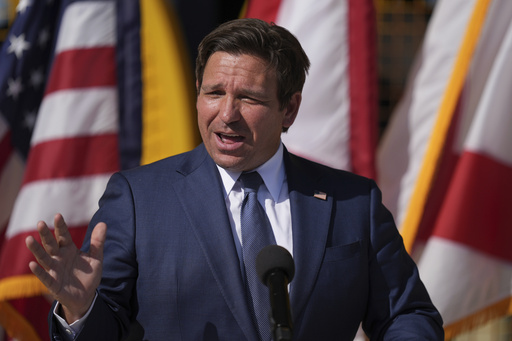
The Hamilton County Sheriff’s Office, located in the suburbs of Indianapolis, has long sought to collaborate with federal immigration authorities to identify and detain undocumented immigrants facing criminal charges. Despite their attempts, the office claims that President Joe Biden’s administration has not responded to their requests. However, with the tightening of immigration enforcement under President Donald Trump, Hamilton County deputies may become the first in Indiana to take on federal immigration duties, a move the Trump administration is eager to replicate nationally.
Chief Deputy John Lowes confirmed, “We definitely are joining,” emphasizing their intention to work with ICE in order to enhance community safety. Under Trump’s leadership, the U.S. Customs and Immigration Enforcement is reviving the 287(g) program, which trains local law enforcement to question immigrants in custody and initiate procedures for potential deportation. This program, established by a section of legislation in 1996, currently relates to individuals who are already incarcerated.
Tom Homan, a key figure in Trump’s immigration strategy, has expressed interest in widening the scope of the program to involve local task forces capable of making street arrests, a concept that was abandoned during the Obama administration due to concerns regarding racial profiling. It remains uncertain whether local authorities would have the power to stop individuals purely to verify immigration status.
Recently, Florida’s Governor Ron DeSantis declared that the Florida Highway Patrol had finalized an agreement with ICE to interrogate, arrest, and detain individuals suspected of being undocumented immigrants, promptly transferring them to federal authorities. DeSantis remarked that this initiative aligns with the president’s aim to implement the largest deportation operation in U.S. history.
Nevertheless, advocates for immigrants are sounding the alarm over these local partnerships that entangle local law enforcement in immigration enforcement efforts. Nayna Gupta, policy director at the American Immigration Council, highlighted concerns about racial profiling and the adverse impact on community crime reporting. “These agreements have a history of disproportionately affecting U.S. citizens and lawful residents,” she noted.
Starting in the early 2000s, the 287(g) program allowed various jurisdictions to enforce immigration laws within their communities rather than solely in jail settings. However, numerous issues emerged, particularly in places like Arizona. A 2011 civil rights investigation led to the Department of Justice finding that deputies in Maricopa County had been involved in racial profiling and illegal stops against Latinos, ultimately resulting in the termination of their agreement.
The 287(g) program has since had a controversial reputation, often seen as a tool for right-wing sheriffs to funnel individuals based on ethnicity into deportation systems, as stated by Lena Graber of the Immigrant Legal Resource Center. Currently, ICE offers two formats for 287(g) agreements: one involving four weeks of training for local officers to question and detain undocumented individuals in jails, while the other requires only eight hours of training and permits local officers to enforce federal immigration warrants.
As of last December, ICE had established 135 agreements with various law enforcement agencies across 21 states, with many requests from additional states pending. Most agreements are concentrated in just three states: Florida, Texas, and North Carolina, and there have been no new agreements accepted under Biden’s tenure.
Upon returning to office, Trump instructed the Department of Homeland Security to bolster these agreements to enable local law enforcement to detain and apprehend undocumented immigrants. At a recent conference with the National Sheriffs’ Association, Homan articulated plans to streamline regulations and reduce training requirements to facilitate greater coordination with immigration authorities. Kieran Donahue, the association’s president, commended these developments, asserting, “Local sheriffs are undoubtedly going to participate in this program.”
However, some sheriffs, like Donahue from Canyon County, Idaho, have opted out due to insufficient resources. He cited a lack of personnel and jail capacity as barriers to joining the program.
Earlier in 2002, the Florida Department of Law Enforcement was the first to establish a 287(g) agreement allowing immigration task forces. Fast forward twenty years, and Florida is now requiring local agencies to participate in this program. Following a tragic incident involving an undocumented immigrant and a college student in Georgia, state lawmakers passed legislation necessitating local enforcement agencies to join the 287(g) program.
In the current legislative session, Republican legislators in several states are advocating for mandatory or incentive-based partnerships with ICE. Texas Representative David Spiller is pushing for compulsory enrollment in the ICE programs, emphasizing their importance for public safety. With substantial funding allocated to local immigration enforcement in Florida, similar legislation has been introduced in states like Tennessee and Indiana to streamline applications for the 287(g) program.
Despite concerns regarding the implications of such legislation, Hamilton County’s Chief Deputy Lowes stated that their focus would be strict and limited to individuals already in custody. Last year, over 500 people suspected of being non-citizens were booked, with ICE involvement in 64 cases. “We believe this program will help reduce crime and remove individuals from our community who jeopardize safety,” Lowes asserted.

